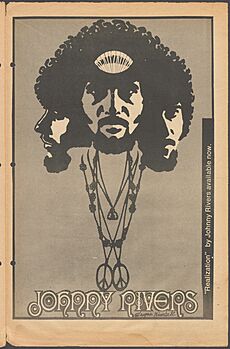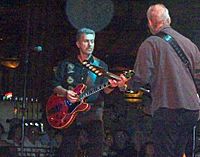Johnny Rivers facts for kids
Quick facts for kids
Johnny Rivers
|
|
|---|---|
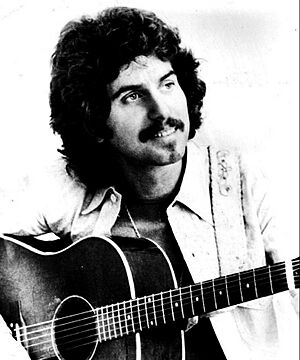
Rivers on October 11, 1975
|
|
| Background information | |
| Birth name | John Henry Ramistella |
| Born | November 7, 1942 New York City, U.S. |
| Origin | Baton Rouge, Louisiana, U.S. |
| Genres | |
| Occupation(s) |
|
| Instruments |
|
| Years active | 1956–2023 |
| Labels | |
Johnny Rivers, born John Henry Ramistella on November 7, 1942, is a famous American musician who is now retired. He became very popular in the 1960s and 1970s as a singer and guitarist. People knew him for his amazing talent and how he could play many different styles of music.
Rivers is most famous for his songs from the 1960s. He helped make the "discotheque" dance scene popular in the mid-60s with his live rock and roll recordings. These were made at a famous club in Los Angeles called the Whisky a Go Go. Later, his music changed to a more soulful sound with bigger orchestras.
Some of his biggest hit songs between 1964 and 1968 were "Memphis", "Mountain of Love", "The Seventh Son", "Secret Agent Man", "Poor Side of Town", "Baby I Need Your Lovin'", and "Summer Rain". Many of these were songs that other artists had sung before. Johnny Rivers had a total of nine songs that reached the top ten on the US music charts. He also had 17 songs that made it into the top forty between 1964 and 1977.
Contents
Johnny Rivers's Life and Music Career
Early Life and Musical Beginnings
Johnny Rivers, whose real name is John Henry Ramistella, was born in New York City. His family has Italian roots. They later moved to Baton Rouge, Louisiana. The unique music style of Louisiana really inspired him.
Rivers started playing guitar at age eight. His father and uncle taught him. When he was still in junior high school, he played with a band called the Rockets. The band leader, Dick Holler, later wrote famous songs like "Abraham, Martin and John".
When he was 14, Rivers formed his own band called the Spades. They made their first record while he was still a student at Baton Rouge High School. Some of their early music was recorded in 1956.
In 1958, Rivers visited New York City and met a famous radio DJ named Alan Freed. Freed told him to change his name to "Johnny Rivers." This name was inspired by the Mississippi River that flows through Baton Rouge. Freed also helped Rivers get some recording deals. From 1958 to 1959, Johnny Rivers released three songs, but they did not sell very well.
Rivers went back to Baton Rouge in 1959. He started performing across the southern United States. In Alabama, he met Audrey Williams, who was Hank Williams's first wife. She told Rivers to move to Nashville, Tennessee, a big music city. There, he found work writing songs and singing demo versions for other artists. Rivers also worked with famous musician Roger Miller. At this time, Rivers thought he might not become a famous singer, so songwriting became his main focus.
Success in the 1960s
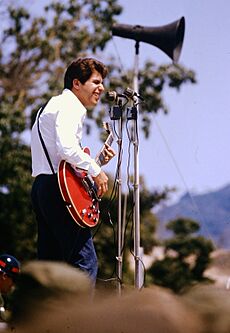
In 1958, Rivers met James Burton, a guitarist who played with Ricky Nelson. Burton later suggested one of Rivers's songs, "I'll Make Believe," to Nelson, who recorded it. Rivers moved to Los Angeles in 1961. He found work there as a songwriter and a musician who plays on other artists' recordings. His big chance came in 1963. He filled in for a jazz band at a Hollywood nightclub called Gazzarri's. People loved his music, and large crowds came to see him.
In 1964, a club owner named Elmer Valentine gave Rivers a one-year contract. Rivers was to perform at the Whisky a Go Go club on Sunset Strip in West Hollywood. The club had only been open for three days when the Beatles' song "I Want to Hold Your Hand" became a huge hit. This started the "British Invasion" where many British bands became popular. This made it hard for American artists to get to the top of the music charts.
However, Johnny Rivers was so popular that a record producer named Lou Adler decided to release a live album. It was called Johnny Rivers Live at the Whisky a Go Go. This album became a big hit, reaching No. 12 on the charts. Rivers remembered that his most requested song at the time was "Memphis". This song reached No. 2 on the music charts in July 1964. It sold over one million copies and earned a gold record award.
Rivers continued to record mostly live performances in 1964 and 1965. These included songs with folk music and blues rock styles. Hits from this time included "Maybellene" and "Mountain of Love". He also had hits with "Midnight Special" and "Seventh Son".
In 1963, Rivers started working with songwriters P. F. Sloan and Steve Barri. They were creating a theme song for an American TV show called Secret Agent. Rivers's song "Secret Agent Man" became very popular. It reached No. 3 on the Billboard Hot 100 chart in 1966. This song also sold a million copies and received a gold record.
In 1966, Rivers began recording slower songs called ballads. These songs often had background singers. His album Changes included the song "Poor Side of Town". Rivers wrote and helped produce this song, and it became his biggest hit, reaching No. 1 on the charts.
He also started his own record company called Soul City Records. This company signed a group called the 5th Dimension. Their songs "Aquarius/Let the Sunshine In" and "Wedding Bell Blues" became No. 1 hits for Rivers's new label. Rivers also helped songwriter Jimmy Webb get his start when the 5th Dimension recorded Webb's song "Up, Up and Away".
Rivers continued to have more hits by singing songs that other artists had recorded first. These included "Baby I Need Your Lovin'" by the Four Tops and "The Tracks of My Tears" by the Miracles. Both of these songs reached the Top 10 in 1967. In 1968, Rivers released the album Realization. This album reached No. 5 on the charts and included the hit song "Summer Rain". The album also showed some psychedelic influences of the time. It marked a change in Rivers's music, with more thoughtful songs.
The 1970s and Beyond
In the 1970s, Johnny Rivers continued to release music. His albums were liked by music critics, but they did not sell as well as his earlier work. His 1972 album L.A. Reggae had a hit song called "Rockin' Pneumonia and the Boogie Woogie Flu." This was a cover of a song by Huey "Piano" Smith and the Clowns. This song became Rivers's third song to sell over a million copies.
Other songs that reached the Top 40 in the 1970s included "Blue Suede Shoes" in 1973. This song was first recorded by Carl Perkins. In 1975, he had a hit with "Help Me Rhonda," which was originally a No. 1 song for the Beach Boys. Brian Wilson from the Beach Boys even sang background vocals on Rivers's version.
Rivers's last song to reach the Top 10 was "Swayin' to the Music (Slow Dancing)" in 1977. His very last song to appear on the Hot 100 chart was "Curious Mind (Um, Um, Um, Um, Um, Um)" in 1977. Rivers also recorded the theme song for the TV show The Midnight Special. Overall, he had nine Top 10 hits and 17 Top 40 hits between 1964 and 1977.
1980s to Present Day
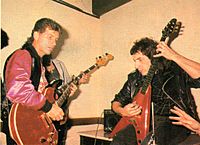
Johnny Rivers kept releasing music into the 1980s. He even had an interview on the TV show American Bandstand in 1981. However, his career in recording new music started to slow down. Around this time, Rivers became a Christian.
In 1998, he brought back his Soul City Records label. He released an album called Last Train to Memphis. In the early 2000s, Rivers recorded music with famous artists like Eric Clapton, Tom Petty, and Paul McCartney. This was for an album that honored the Crickets, who were Buddy Holly's backup band.
Johnny Rivers is one of the few performers who own the copyright to their own recordings. Usually, the record company owns these rights. Other artists who own their copyrights include Mariah Carey and Paul Simon. This practice became more common after the Bee Gees won a large lawsuit against their record company.
On June 12, 2009, Johnny Rivers was honored by being added to the Louisiana Music Hall of Fame. Many people have suggested his name for the Rock and Roll Hall of Fame, but he has not been chosen yet. However, Rivers was nominated for America's Pop Music Hall of Fame in 2015.
On April 9, 2017, he performed a song at the funeral for Chuck Berry in St. Louis, Missouri. He played his acoustic guitar while singing.
In 2019, Rivers announced that he would be going on a farewell tour. His last live performance was in July 2023. It took place at the Commerce Casino near Los Angeles.
Discography
See also
 In Spanish: Johnny Rivers para niños
In Spanish: Johnny Rivers para niños
 | Jewel Prestage |
 | Ella Baker |
 | Fannie Lou Hamer |


